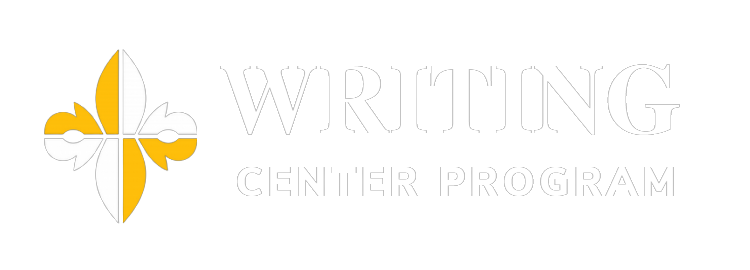The Writing Fellows Program (For Faculty)
What Is the Writing Fellows Program?
The Undergraduate Writing Fellows Program brings together talented undergraduate writers and dedicated faculty members to improve student writing in a variety of disciplines and to establish a culture of writing and revision at Nazarbayev University. This three-semester fellowship prepares students across all majors to serve as undergraduate peer writing tutors, or Writing Fellows, who in turn work with other students to help them become better writers through dialog and collaboration.
This interactive approach to writing allows student writers to be active participants in their learning; with Writing Fellow support, they can identify areas where they need the most improvement in their writing and learn strategies to help them not only write better papers, but become strong, independent writers and learners.
All Writing Fellows are trained to write insightful and critically constructive comments, which they are able to do because they are careful, analytical readers. They are not TAs or substitutes for professors; while they may not have subject expertise, they are educated, inquisitive readers who can help student writers more clearly express their analysis, arguments, ideas, etc. Whereas student writers bring their content knowledge to the table, Writing Fellows bring their expertise in writing, thus creating a balanced, intellectual partnership of mutual learning.
This interactive approach to writing allows student writers to be active participants in their learning; with Writing Fellow support, they can identify areas where they need the most improvement in their writing and learn strategies to help them not only write better papers, but become strong, independent writers and learners.
All Writing Fellows are trained to write insightful and critically constructive comments, which they are able to do because they are careful, analytical readers. They are not TAs or substitutes for professors; while they may not have subject expertise, they are educated, inquisitive readers who can help student writers more clearly express their analysis, arguments, ideas, etc. Whereas student writers bring their content knowledge to the table, Writing Fellows bring their expertise in writing, thus creating a balanced, intellectual partnership of mutual learning.
When Writing Fellows collaborate with undergraduate student writers and faculty mentors, they uphold the university’s graduate attributes by becoming open-minded, thoughtful, and innovative communicators who are committed to social and ethical responsibilities as intellectual leaders.

What Are The Requirements?
Am I Eligible to Request The Help Of A Writing Fellow?
You are eligible to request a Writing Fellow if:
- You are teaching a course with 2 major writing assignments (8-10 pages).
- You will have at least 12 students enrolled in your course (each Fellow sees about 10-12 students, so a class of 36 students will have 3 Fellows).
- You are willing to adjust your syllabus to allow time for revision and to require that all enrolled students work with the assigned Fellow(s).
- You are willing to meet regularly with the assigned Fellow(s) to discuss assignments.
What Is It Like to Work With a Writing Fellow? What are the Benefits?
When you work with Writing Fellows, you have dedicated writing tutors for your students, allowing you to concentrate more on evaluating the content of student papers. Writing Fellows can also assist you in clarifying assignment goals and expectations for draft and final assignments. Faculty members who have worked with Writing Fellows often report that students who commit to working with Writing Fellows do better in terms of their writing content and structure.

How Does The Process Work?
Collect Your Student Drafts
Students will submit drafts of their papers to you, which you will then give to your Writing Fellow(s) two weeks before the final assignment due date.
Students Consult With A Writing Fellow
Writing Fellows will read, comment, and meet one-on-one with students to discuss strategies for revision and improvement.
Students Revise Their Work
Students will revise their work based on the suggestions and comments they received during the consultation.
Final Submissions
Students will submit the final version of their work on the assignment due date, along with their previous draft containing the Fellow’s comments and suggestions.
What Can I Expect from a Writing Fellow?
answer:
Writing Fellows are first and foremost writing tutors, meaning that they work explicitly with writing organization and structure and not course content. Writing Fellows read student drafts and craft constructive end-note commentary for students to review before meeting with them for a 30-minute consultation to discuss the comments. This consultation is paramount to the writing process as it provides students with ideas for moving forward in their writing and strategies for being a better writer overall.
To that effect, Writing Fellows expect full participation and engagement from students - what might be misconstrued as passiveness may actually be them providing their students with an opportunity to work through their questions and try out new strategies. Briefly, here is a list of what Writing Fellows do and don’t do:
To that effect, Writing Fellows expect full participation and engagement from students - what might be misconstrued as passiveness may actually be them providing their students with an opportunity to work through their questions and try out new strategies. Briefly, here is a list of what Writing Fellows do and don’t do:
What Fellows Do
- Writing Fellows comment on and meet with students for 2 papers.
- Writing Fellows write detailed end-note and marginal constructive comments for student drafts that are submitted on time.
- Writing Fellows meet with students to discuss these comments and to help students develop strategies for better writing.
What Fellows Don't Do
- Fellows do not attend classes or address course content. While they may have some familiarity with the discipline, they will encourage your students to speak with you about any content-related questions.
- Fellows do not address grammar errors (unless they impede comprehension) as their training does not focus on constructive strategies for language learning and correction.
What Do Writing Fellows Need from Faculty?
What's My Role?
What's My Role?
Be sure your students understand that the Writing Fellows are an integral part of your course.The more clearly your students understand what Fellows do, how valuable you hold their contributions, and how crucial working with them is to their success, the more seriously they’ll work with their Fellows.
Keep the lines of communication open and active. Please check in with the Fellows as they may have questions, concerns, and needs for advice, and respond promptly to their emails and be available to meet.
Establish clear policies and stick to them. For the cycle of drafts, conferences, and revisions to work, we need clear policies on late drafts, extensions, and attendance at conferences. Please establish these with your Fellows at your first meeting, make sure that your students know what the policies are, and hold to them through the term.
The Writing Fellows are bright, resourceful, and active learners, but they will need your guidance, support, and consideration, which you can provide as follows:
Faculty Experiences: What Others Have Said
The Writing Fellows Faculty Handbook
This handbook contains the philosophy of the Undergraduate Writing Fellows sequence and explains how you will most effectively be able to include Writing Fellow support into your course.
You’ll find our principles and goals, an explanation of how our sequence works, answers to frequently asked questions, and some samples of syllabi and other course material that will allow for you to easily incorporate and introduce Writing Fellows to your students. There is also the Checklist, p. 11 to help you through course planning before and during the term.
You’ll find our principles and goals, an explanation of how our sequence works, answers to frequently asked questions, and some samples of syllabi and other course material that will allow for you to easily incorporate and introduce Writing Fellows to your students. There is also the Checklist, p. 11 to help you through course planning before and during the term.
The Writing Fellows Research Consortium
The Writing Fellows Research Consortium is student research presentations held at the end of every semester as part of course activities open to an extended audience. This event is an occasion for Writing Fellows–talented undergraduate writers enrolled in the second (WCS 391) and third (WCS 392) courses of the Writing Fellows Sequence–to share their research and receive feedback beyond the classroom.
All students enrolled in the sequence, Writing Fellow Interns, Writing Fellow alumni, all students and all faculties in the community are welcome. Fellows present work-in-progress research projects on a variety of research issues of interest in peer tutoring and writing center scholarship that they have been exploring from the perspective of our concrete and immediate context.
View the Spring 2025 Program
All students enrolled in the sequence, Writing Fellow Interns, Writing Fellow alumni, all students and all faculties in the community are welcome. Fellows present work-in-progress research projects on a variety of research issues of interest in peer tutoring and writing center scholarship that they have been exploring from the perspective of our concrete and immediate context.
View the Spring 2025 Program
For Additional Information and Questions Contact
-
James (Jim) SwiderWriting Center Coordinator
WCP InstructorEMAIL: james.swider@nu.edu.kz
© 2023 Writing Center Program
Contact Info
+7 (7172) 69 48 12 -------- +7 (7172) 70 47 33
Kabanbay Batyr Avenue 53, Astana, Kazakhstan
